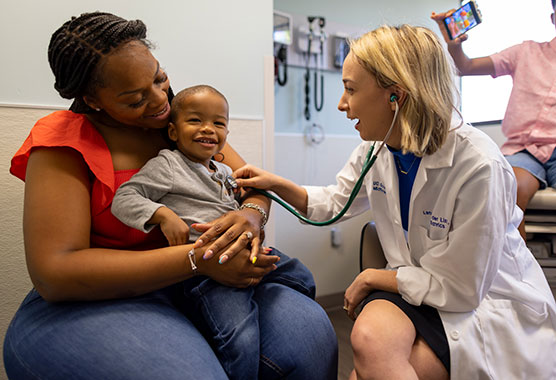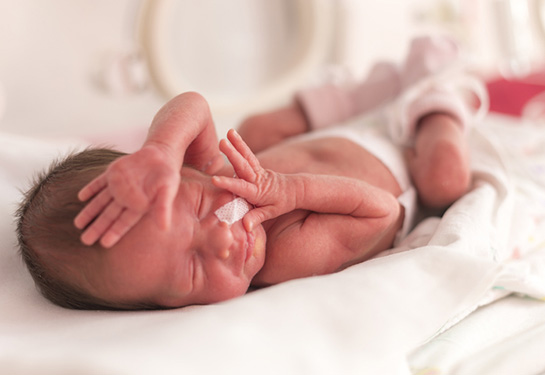Developmental Milestones
As children grow, they tend to follow a typical pattern of development. But when children don’t reach certain physical, social or behavioral milestones, prompt identification and treatment can help them reach their potential.
Medically reviewed by Roger Scott Akins, D.O. on Feb. 01, 2024.

Compassion and Expertise at Every Stage
At UC Davis Health, we are committed to helping your child reach their developmental potential. Our team of child development experts stands ready to provide personalized support to help your child thrive.
Our Difference
Renowned Pediatric Developmental and Mental Health Specialists
The UC Davis MIND Institute and Department of Pediatrics are regional and national leaders in developmental and behavioral pediatrics, child psychology, child psychiatry and genomic medicine. Our highly trained physicians and therapists help children overcome challenges at all stages of development.
Comprehensive Child Mental Health Services
We provide comprehensive outpatient mental health services to children of all ages. In our Child and Adolescent Psychiatry division, we offer evaluations for developmental concerns, family and individual therapy and medication management.
Innovative Research
Our providers conduct research and clinical trials aimed at improving children’s mental health and quality of life. These efforts help your child benefit from the latest advances in the care of neurodevelopmental disabilities and behavioral health conditions.
What Are Developmental Milestones?
Developmental milestones describe skills most children can do by a certain age. Sitting independently, taking first steps and saying first words are examples of developmental milestones.
Knowing these milestones can help caregivers and health care providers track your child’s developmental progress and identify any delayed milestones early. This way, children can be referred for helpful therapies and evaluation with developmental specialists when needed.
Five Types of Developmental Milestones:
Cognitive Milestones
Cognitive milestones involve how your child learns, thinks and solves problems. For example, cognitive milestones track their ability to solve problems, follow directions and sort objects.
Fine Motor Milestones
Motor skills refer to your child’s ability to use their muscles to move and perform tasks. Fine motor skills refer to your child’s ability to use their hands and fingers to perform tasks. Examples of these milestones include transferring objects between hands, writing their name, using scissors and tying shoelaces.
Gross Motor Milestones
Gross motor skills refer to your child’s ability to use their bigger muscles. Examples of gross motor milestones include learning to crawl, walk, run and jump.
Language Milestones
Language milestones track your child’s ability to speak and communicate. Examples include saying their first words, following simple directions and speaking in sentences.
Social-Emotional and Behavioral Milestones
These kinds of milestones involve how your child interacts with others, understands their own feelings and follows routines. Examples include smiling in response to others and playing with other children.
Developmental Milestones by Age
Watch for these developmental milestones as your child grows. The Centers for Disease Control and Prevention (CDC) has a complete list of developmental milestones. Contact your child’s provider for help if you have concerns about any aspect of your child’s development.
Typical milestones to watch for include:
2 Months
By 2 months old, most babies can smile at you, hold their head up during tummy time and make cooing sounds.
4 Months
By 4 months old, most babies are starting to laugh, notice their hands and bring their hands to their mouth.
6 Months
By 6 months old, most infants can recognize familiar faces, laugh and make sounds in response to yours. They can also roll over.
9 Months
By 9 months old, most babies know their name, make many different sounds, understand objects exist when hidden out of sight (object permanence) and can sit without help.
1 Year
By their first birthday, most babies can play interactive games like pat-a-cake and wave “hi” or “bye.” They can also pull themselves up to stand and pick up small objects using their thumb and pointer finger.
15 Months
By 15 months old, most toddlers can show affection with hugs and kisses, say “mama” and “dada” and have taken their first steps.
18 Months
Eighteen-month milestones include being able to say more than three words (in addition to “mama” and “dada”), walk independently and feed themselves using their fingers.
2 Years
Most 2-year-olds can notice others’ emotions, independently eat with a spoon and run.
30 Months (2.5 Years)
By 30 months old, most toddlers can help clean up their toys when asked, say about 50 words, play pretend games and jump with two feet.
3 Years
Most 3-year-olds can play with other children, speak clear enough for others to understand them and use a fork.
4 Years
By 4 years old, most children can change their behavior based on the situation, identify some colors and catch a large ball.
5 Years
Most 5-year-olds can follow rules when playing games, hold a conversation, rhyme, count to 10 and hop on one foot.
“Important Milestones: Your Child by Five Years,” Centers for Disease Control and Prevention (CDC), https://www.cdc.gov/ncbddd/actearly/milestones/milestones-5yr.html
Request an Appointment
As Sacramento's No. 1 hospital, you'll benefit from unique advantages in primary care and specialty care. This includes prevention, diagnosis and treatment options from experts in 150 specialties.
Referring Physicians
To refer a patient, submit an electronic referral form or call.
800-4-UCDAVIS
Patients
Call to make an appointment.
Consumer Resource Center
800-2-UCDAVIS

Ranked among the nation’s best hospitals
A U.S. News & World Report best hospital in cardiology, heart & vascular surgery, diabetes & endocrinology, ENT, geriatrics, neurology & neurosurgery, and pulmonology & lung surgery.

Ranked among the nation’s best children’s hospitals
U.S. News & World Report ranked UC Davis Children’s Hospital among the best in pediatric nephrology, orthopedics*, and pulmonology & lung surgery. (*Together with Shriners Children’s Northern California)

Ranked Sacramento’s #1 hospital
Ranked Sacramento’s #1 hospital by U.S. News, and high-performing in aortic valve surgery, back surgery (spinal fusion), COPD, colon cancer surgery, diabetes, gynecological cancer surgery, heart arrhythmia, heart failure, kidney failure, leukemia, lymphoma & myeloma, lung cancer surgery, pacemaker implantation, pneumonia, prostate cancer surgery, stroke, TAVR, cancer, orthopedics, gastroenterology & GI surgery, and urology.

The nation’s highest nursing honor
UC Davis Medical Center has received Magnet® recognition, the nation’s highest honor for nursing excellence.

World-class cancer care
One of ~59 U.S. cancer centers designated “comprehensive” by the National Cancer Institute.

A leader in health care equality
For the 13th consecutive year, UC Davis Medical Center has been recognized as an LGBTQ+ Healthcare Equality Leader by the educational arm of America’s largest civil rights organization.

